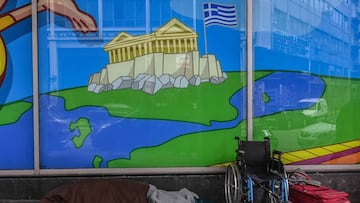Coronavirus: how Greece is beating Covid-19 after debt crisis
Many people still see Greece as the country needing continuous financial aid from the European Union as they struggled to escape debt. But a new story is being written.


With a large proportion of its population in their latter stage of life, well documented economic turmoil stretching back more than a decade and a health service that left little scope for dealing with an ICU emergency, Greece may not have been a country that people would’ve expected to deal with the current pandemic quite so well. But, at least for the time being, they can be held up as a positive example.
Greece coping with Covid-19
Coronavirus has hit other European countries like Italy and Spain hard, with the number of cases well in excess of 150,000 as per Tuesday 14 April, and deaths in and around the 20,000 mark. Compare that to Greece, with a population of around 11 million, where they have confirmed cases of just over 2,000 and are on the verge or reaching 100 deaths. Still 100 too many, but a different world it would seem, and there are reasons behind this.
Every night Greeks listen with interest as a politician and viral disease expert give them their daily information, much like most other nations are doing to different degrees. The message that has been clearly communicated since the start, however, has been crystal clear: stay at home.
With an understanding of the health service limitations, in particular the number of beds available to them for patients needing intensive care, what else were they going to say? They could not allow the situation to inundate hospitals, as there just wasn’t enough care available and it would have quickly got out of hand with devastating effects.

This is why the government, with scientific knowledge at their side, began to counter the potential spread before the virus had even arrived in Greece. Flights into the country from China, and other hotspots, were checked; hotel quarantines were arranged as Greeks returned home from places like Italy and Spain; tests were being carried out to identify and isolate infected people.
As other leaders of countries around Europe and beyond talk about themselves having been as prepared as possible for this outbreak, Greece’s prime minister, Kyriakos Mitsotakis, may, at least in this case, have shone a light on how this could have been handled better. Rather than looking for political spin to paint a more positive picture on an extremely dark canvas, the Greek government focused simply on medical expertise.
Experts not political spin
“Some problems can be solved through spin and others require truth and transparency,” Mitsotakis’ economic advisor, Alex Patelis, said. “It was very clear that we needed experts and we needed to listen to them.”
The early lockdown was a bold play. When we hear other politicians saying that they are on the verge of ‘the biggest decision I’ll ever make’ regarding the economic impact of a lockdown, we must consider that of Greece. Just as their economy was hinting at some optimism after years of cuts and pain, they shut up shop. Schools were closed, concerts and large gathering cancelled, and this then encapsulated the rest of the public meeting areas such as cinemas, bars, restaurants and the like. Tourism, such a vital source of revenue to the country, effectively switched off. And this was before Covid-19 had taken hold, not an easier-to-justify reactive response.
Greeks, now in lockdown, are experiencing a landmark leap forward into the digital age.https://t.co/s0WGO8yj3W
— The Greek Analyst (@GreekAnalyst) April 8, 2020
Related stories
Further action was enacted to encourage the population to stay at home, with government systems and processes updated to support. No longer did Greeks have to make their journeys to a local office to complete their necessary paperwork or to their health centre to collect a prescription. This was now either online or via their smartphone. Of course there was pushback from some, they’ve come through some very hard times of late, and there were religious objections too.
Time will tell how this pandemic plays out across the globe, and a good deal of political spin and media narrative will determine what stories are told about it. One thing that Greece’s officials are hoping for is that they can get to the other side with their heads held high, knowing that they saved as many lives as they could. If they can, their economy rebuild may return faster and stronger.

